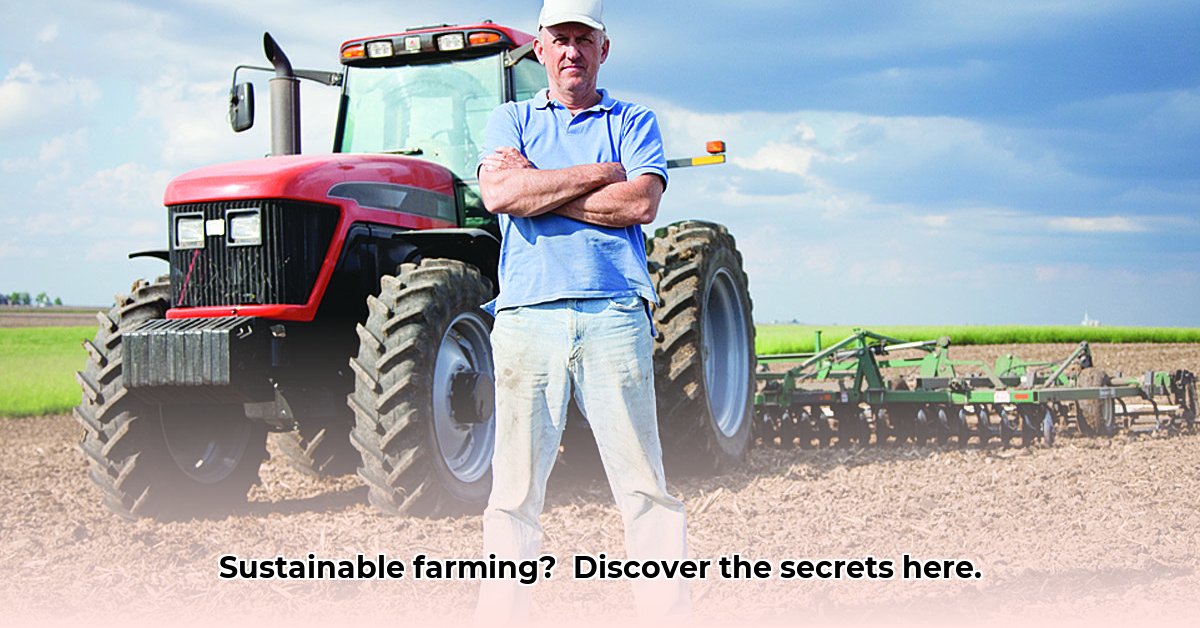
Tractor Supply Company (TSC), a ubiquitous presence in rural America, plays a significant role in the agricultural landscape. Its vast network of stores provides essential resources for farmers of all sizes, potentially bolstering sustainable practices. However, the company's current lack of transparency around its supply chain raises serious questions about its true environmental impact. This article examines TSC's role in sustainable agriculture, highlighting both its contributions and areas needing improvement. We offer actionable steps for farmers, consumers, TSC itself, and researchers to foster a more sustainable future. For more information on TSC's ryegrass initiatives, see this page.
TSC's Contribution to Sustainable Agriculture: A Balanced Perspective
TSC's extensive product catalog, ranging from seeds and fertilizers to livestock feed and equipment, offers farmers convenient access to essential supplies. This centralized resource arguably reduces fuel consumption associated with multiple sourcing trips, indirectly contributing to sustainability. However, a critical void exists in publicly available information detailing the environmental impact of TSC's supply chain. The lack of transparency regarding sourcing practices for key products such as wood fencing and livestock feed hinders a complete evaluation of their overall sustainability efforts. This opacity presents a considerable challenge in assessing TSC's true contribution to sustainable agriculture.
The Sustainability Gap: Unanswered Questions and Potential Risks
Several key areas require further scrutiny to accurately assess TSC's sustainability commitment. The environmental implications of feed production sourcing are unclear, potentially impacting animal welfare and the broader environment. Similarly, the availability of chemical-intensive lawn and garden products raises concerns about water contamination, soil degradation, and potential human health risks. These are not merely theoretical risks; they reflect a real need for enhanced transparency and proactive mitigation strategies. Without sufficient information, it's difficult to fully evaluate TSC's environmental footprint, leading to uncertainty among farmers and other stakeholders. How can we promote sustainable agriculture when critical elements of the supply chain remain opaque?
Actionable Steps for a Greener Future
Sustainable agriculture requires collaborative effort. The following steps outline actionable strategies for various stakeholders to promote more environmentally responsible practices.
For Tractor Supply Company:
- Immediate Action (0-1 Year): Conduct comprehensive, third-party audited assessments of the entire supply chain to identify environmental impacts. Publicly disclose findings and sourcing practices with complete transparency. This immediate action demonstrates a commitment to accountability.
- Long-Term Strategy (3-5 Years): Develop a robust Environmental, Social, and Governance (ESG) strategy with specific, measurable, achievable, relevant, and time-bound (SMART) goals. Publish regular progress reports to maintain accountability and demonstrate continuous improvement. This long-term plan is essential for sustained progress.
For Farmers and Gardeners:
- Immediate Action (0-1 Year): Adopt sustainable farming methods such as crop rotation, precision irrigation, and integrated pest management. Actively seek out sustainably sourced products at TSC and other retailers, using purchasing power to incentivize environmentally conscious practices. Direct consumer demand drives market changes.
- Long-Term Strategy (3-5 Years): Engage in advocacy within their communities to support policies promoting sustainable agriculture and better supply chain transparency. Support businesses that prioritize environmental responsibility through conscious consumer choices. Collectively, farmers can influence the market.
For Consumers:
- Immediate Action (0-1 Year): Make informed purchasing decisions, prioritizing sustainably sourced goods whenever possible. Encourage TSC and other retailers to expand their offerings of certified sustainable products. Consumer demand for sustainable choices is crucial.
- Long-Term Strategy (3-5 Years): Support businesses committed to environmental responsibility through purchasing and advocacy. Demand transparency from companies and directly share feedback to influence corporate decision-making. Consumers wield considerable market power.
For Researchers and NGOs:
- Immediate Action (0-1 Year): Conduct independent assessments of TSC's environmental impact to provide concrete recommendations for improvement. Disseminate findings publicly and engage with TSC to foster collaborative solutions. Independent verification promotes accountability.
- Long-Term Strategy (3-5 Years): Partner with TSC and other stakeholders to develop and implement educational resources and best practices for farmers on sustainable product selection and farming techniques. Educational programs are vital for long-term impact.
Mitigating Risks: A Collaborative Approach
Addressing the potential risks associated with TSC's operations requires a collaborative and transparent approach. The following table expands on this idea, highlighting potential mitigation strategies:
| Risk Category | Potential Impact | Mitigation Strategies |
|---|---|---|
| Unsustainable Feed Sourcing | Animal welfare concerns; environmental damage; | Demand complete supply chain transparency from TSC; support sustainably sourced feed options. |
| Chemical-intensive Lawn & Garden Products | Water and soil contamination; human health risks; | Promote organic alternatives; provide comprehensive educational resources on sustainable practices. |
| Promotion of Intensive Farming | Resource depletion; soil erosion; biodiversity loss; | Promote sustainable farming techniques; partner with NGOs to provide farmers with support and education. |
The Path Forward: Transparency and Collaboration are Key
TSC holds a pivotal position in the agricultural sector, possessing the potential to significantly influence sustainable practices. By embracing transparency, engaging in meaningful collaboration with stakeholders, and proactively implementing comprehensive sustainability initiatives, TSC can strengthen its commitment to environmental stewardship and contribute meaningfully to a healthier agricultural future. A more sustainable future requires transparency, collaboration, and a commitment from all involved.